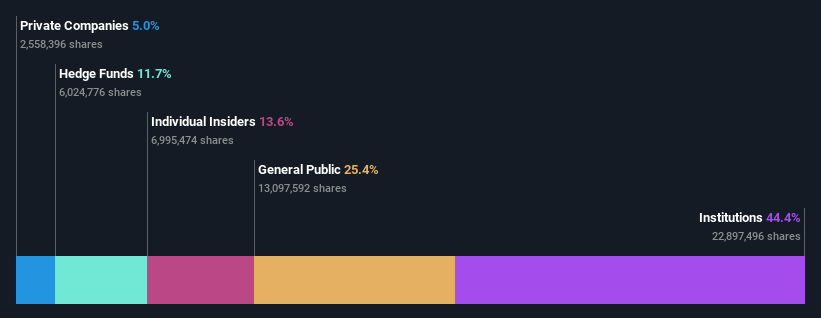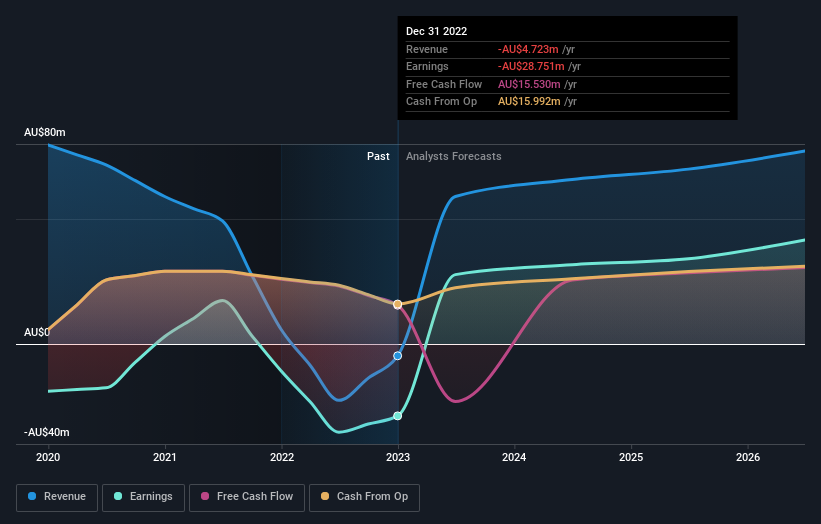Stock Analysis
- Australia
- /
- Capital Markets
- /
- ASX:PAC
Institutional investors control 44% of Pacific Current Group Limited (ASX:PAC) and were rewarded last week after stock increased 37%

Key Insights
- Institutions' substantial holdings in Pacific Current Group implies that they have significant influence over the company's share price
- The top 5 shareholders own 53% of the company
- Insiders own 14% of Pacific Current Group
To get a sense of who is truly in control of Pacific Current Group Limited (ASX:PAC), it is important to understand the ownership structure of the business. With 44% stake, institutions possess the maximum shares in the company. Put another way, the group faces the maximum upside potential (or downside risk).
And as as result, institutional investors reaped the most rewards after the company's stock price gained 37% last week. The one-year return on investment is currently 40% and last week's gain would have been more than welcomed.
Let's delve deeper into each type of owner of Pacific Current Group, beginning with the chart below.
See our latest analysis for Pacific Current Group

What Does The Institutional Ownership Tell Us About Pacific Current Group?
Institutional investors commonly compare their own returns to the returns of a commonly followed index. So they generally do consider buying larger companies that are included in the relevant benchmark index.
We can see that Pacific Current Group does have institutional investors; and they hold a good portion of the company's stock. This suggests some credibility amongst professional investors. But we can't rely on that fact alone since institutions make bad investments sometimes, just like everyone does. When multiple institutions own a stock, there's always a risk that they are in a 'crowded trade'. When such a trade goes wrong, multiple parties may compete to sell stock fast. This risk is higher in a company without a history of growth. You can see Pacific Current Group's historic earnings and revenue below, but keep in mind there's always more to the story.

Our data indicates that hedge funds own 12% of Pacific Current Group. That catches my attention because hedge funds sometimes try to influence management, or bring about changes that will create near term value for shareholders. River Capital Pty Ltd. is currently the largest shareholder, with 17% of shares outstanding. Perpetual Limited is the second largest shareholder owning 14% of common stock, and Regal Funds Management Pty Limited holds about 12% of the company stock. Additionally, the company's CEO Paul Greenwood directly holds 1.3% of the total shares outstanding.
To make our study more interesting, we found that the top 5 shareholders control more than half of the company which implies that this group has considerable sway over the company's decision-making.
While it makes sense to study institutional ownership data for a company, it also makes sense to study analyst sentiments to know which way the wind is blowing. There are plenty of analysts covering the stock, so it might be worth seeing what they are forecasting, too.
Insider Ownership Of Pacific Current Group
The definition of an insider can differ slightly between different countries, but members of the board of directors always count. Management ultimately answers to the board. However, it is not uncommon for managers to be executive board members, especially if they are a founder or the CEO.
Insider ownership is positive when it signals leadership are thinking like the true owners of the company. However, high insider ownership can also give immense power to a small group within the company. This can be negative in some circumstances.
It seems insiders own a significant proportion of Pacific Current Group Limited. Insiders have a AU$72m stake in this AU$532m business. It is great to see insiders so invested in the business. It might be worth checking if those insiders have been buying recently.
General Public Ownership
The general public-- including retail investors -- own 25% stake in the company, and hence can't easily be ignored. While this size of ownership may not be enough to sway a policy decision in their favour, they can still make a collective impact on company policies.
Private Company Ownership
Our data indicates that Private Companies hold 5.0%, of the company's shares. It might be worth looking deeper into this. If related parties, such as insiders, have an interest in one of these private companies, that should be disclosed in the annual report. Private companies may also have a strategic interest in the company.
Next Steps:
It's always worth thinking about the different groups who own shares in a company. But to understand Pacific Current Group better, we need to consider many other factors. To that end, you should be aware of the 2 warning signs we've spotted with Pacific Current Group .
If you would prefer discover what analysts are predicting in terms of future growth, do not miss this free report on analyst forecasts.
NB: Figures in this article are calculated using data from the last twelve months, which refer to the 12-month period ending on the last date of the month the financial statement is dated. This may not be consistent with full year annual report figures.
Valuation is complex, but we're helping make it simple.
Find out whether Pacific Current Group is potentially over or undervalued by checking out our comprehensive analysis, which includes fair value estimates, risks and warnings, dividends, insider transactions and financial health.
View the Free AnalysisHave feedback on this article? Concerned about the content? Get in touch with us directly. Alternatively, email editorial-team (at) simplywallst.com.
This article by Simply Wall St is general in nature. We provide commentary based on historical data and analyst forecasts only using an unbiased methodology and our articles are not intended to be financial advice. It does not constitute a recommendation to buy or sell any stock, and does not take account of your objectives, or your financial situation. We aim to bring you long-term focused analysis driven by fundamental data. Note that our analysis may not factor in the latest price-sensitive company announcements or qualitative material. Simply Wall St has no position in any stocks mentioned.
About ASX:PAC
Pacific Current Group
Pacific Current Group Limited engages in multi-boutique asset management business worldwide.
Excellent balance sheet unattractive dividend payer.

